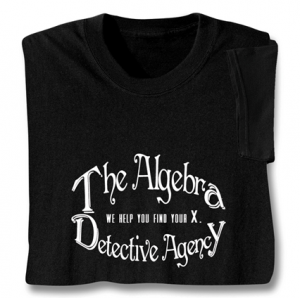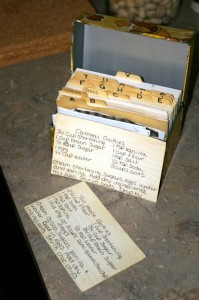 I’ve been thinking, experimenting and testing out ideas about how to move math instruction forward in my classroom, using technology and Problem-Based Learning as much as I can. It’s a daunting task even if I’ve done it before in science. We have a very different set of inputs and outputs in math class.
I’ve been thinking, experimenting and testing out ideas about how to move math instruction forward in my classroom, using technology and Problem-Based Learning as much as I can. It’s a daunting task even if I’ve done it before in science. We have a very different set of inputs and outputs in math class.
I’ve also been wondering what “Teaching in the Age of Siri” really means for the way we teach. I believe we have students who think they can Google the answer to anything that is asked in school. And then, when they run up against questions that aren’t Google-able, they’re stumped.
This week, I gave students pretty tough problems about functions that involved square roots. They really didn’t know anything about square roots. But rather than just telling them about square roots, I took a bit of time to explain that we were going to learn what to do when you can’t find the answer on Google or have a friend tell you.
I gave them 10 minutes to find out everything they could about a square root — anything that they thought might help them answer the two-part question I gave them. Detective work.
Making real connections
I wanted to connect what I was asking them to do to the real world (in edu-speak, we’re working on “career-readiness skills”). So I explained that rarely have I had a boss/supervisor who took the time to show me how to do my job. Most of the time, they expected me to already know how to do something.
That was very puzzling for my students. Why wouldn’t my boss help me, they wondered? It wasn’t until I explained that bosses (or at least the kind I’ve had) hire me to do something that they think I can either already do or that I’m smart enough to teach myself how to do. It wasn’t that they were being mean to me. In fact, it was just the opposite. They had confidence in me to solve problems as they come up in my job assignments.
That was a huge flip in my students’ view of the world — something none of my 8th graders had considered before. They’ve spent most of their lives in school being led and supported from one learning experience to the next. Before panic set in, I assured them that I wasn’t going to be like a boss and just assume they knew everything there was to know about algebra. But I went on to say that the experimental learning style we were about to do was a first step towards becoming the kind of independent learner that will be valued by their future bosses.
The search was on
My students used laptops, the textbook, their smartphones, the algebra reference books I have in the room, the notes I’ve given throughout this unit. Some even asked Siri for help. Don’t tell, but I really didn’t care where they searched or what they brought back to the table. I just wanted them to get used to the idea of searching for new knowledge.
Then I led them in a class discussion about what, in all they found, might be relevant to solving the problem. Once the class decided what was most helpful (and I have to tell you, they learned a ton that they didn’t need to know but was just there for the learning), we talked about what to do next, now that you’d found information that could help you solve the problem.
Honestly, I don’t think many of them have ever consciously experienced that kind of reasoning.
Wrestling with solutions
So we set about turning found-info into useful knowledge and something that solves the problem. And they really loved it. They argued and wrestled with all the info they’d collected and then built their conjectures.
After conjectures they had to use evidence from “tests” they could run with their graphing calculators to see whether the info they found matched up. My role here wasn’t to teach — it was to coach them. I helped them realize that once they had useful info, now they had to do something with it.
 It’s a bit like baking — you search for recipes, consider a bunch of ingredients, make your choices, and try out several batches until you produce delicious cookies.
It’s a bit like baking — you search for recipes, consider a bunch of ingredients, make your choices, and try out several batches until you produce delicious cookies.
They were thinking critically — tying together all the little discrete factoids they had from prior knowledge, adding in this mini-research, and addressing a new problem. Eventually they correctly solved the problem. And guess what — along the way we discovered a whole lot more than the single answer to the two-part problem. Thanks to the search and discovery, I think they’ll probably retain the learning better.
What did I learn? They need some hand-holding and practice as they get the hang of how to take “found” information and “think it” into meaning. I need to figure out how much scaffolding and support and practice is just enough.
I’m definitely going to use this technique again, refining and sharpening the process. We aren’t all the way to PBL yet. But I think this kind of inquiry activity is foundational — it begins to shift responsibility for learning onto the students’ shoulders.
It’s a precursor to doing a full-blown problem or project-based learning activity, or maybe a STEMy kind of lesson that includes the engineering design process. That would definitely be cool!
Marsha Ratzel
Latest posts by Marsha Ratzel (see all)
- Scaffolding Quadratics: 2 Things My 8th Graders Taught Me with Student Feedback - May 20, 2019
- Student-Driven Common Core Classrooms - February 14, 2013
- Shifting toward PBL in Math - December 6, 2012


Awesome post, Marsha! You are truly inspiring. My favorite quote from you was teaching students “how to take “found” information and “think it” into meaning.” So powerful! I posted your blog on our school Facebook page. I know our middle and upper school teachers will get so much out of it. I am already thinking of ways I could adapt this concept for my 4th graders. Thanks again for sharing and inspiring.
Thanks Heidi,
This was a problem for my students and I could sense it, but never really knew how to describe it. So I thought and thought about what was the disconnect between them finding information and still being unsuccessful.
Finally I realized they didn’t know how to synthesize what they’d found into something useable.
That was the whole key to turning a corner, I think.
Okay, first of all, I want the t-shirt! I’m still laughing! I was really struck by your honest discussion with your class about your boss largely just expecting that you knew what to do, and that that was a good thing! I could almost see the light bulbs going on from here. Thanks for continuing to challenge me to take a good look at what’s happening in my classroom.
Dear Lisa,
Thank you for your comment. We are pushed to include as much career readiness as possible in everything we do.
I wish I thought this connection was as bright for them. I struggle to make this kind of remark helpful to motivating them. Do you do anything that helps your students connect to future jobs? I’d love to have some more toolbox “go-to’s”.
Lisa,
What great thoughts! I especially enjoy the initial response shown by your 8th graders. It’s always an accomplishment to successfully “throw a curve ball” in the classroom; I fear it gets more and more difficult to do so as students get older. Bravo! Thanks for the inspiring methods to consider for my own classroom of 6th graders.
Dear Charlie,
Thanks for posting your ideas. It is a challenge to make sure every lesson has that “pull” to draw students into the wonder of it. I couldn’t agree more.
I think it helps when we get to stay in the same assignment for more than a year…so when we come back to this lesson again next year, we can apply what we learned the first time through to make it better and better with each repeat.
I like the idea of having students do a quick “research” on a topic and then having to weed through all of that information to find relevant items that will help them with their task. It was a very simple way to introduce students to the inquiry process and I look forward to having our teachers explore this with their students. I want that t-shirt too!
Dear Chris,
And “they” say that you can’t do research in math!!! Oh yes we can.
It’s just a matter of how long and what we are researching. I see this mini-search as a prime example of what most adults do everyday. Don’t you look up that quick fact and then use it? I sure do. And I think it keeps us from getting stuck in a problem where we just need a tidbit of info to keep going.
I hope that’s what students take away from this.
Thanks for posting a reply…and I love the idea of weeding!!! Great analogy. Good to hear your perspective.